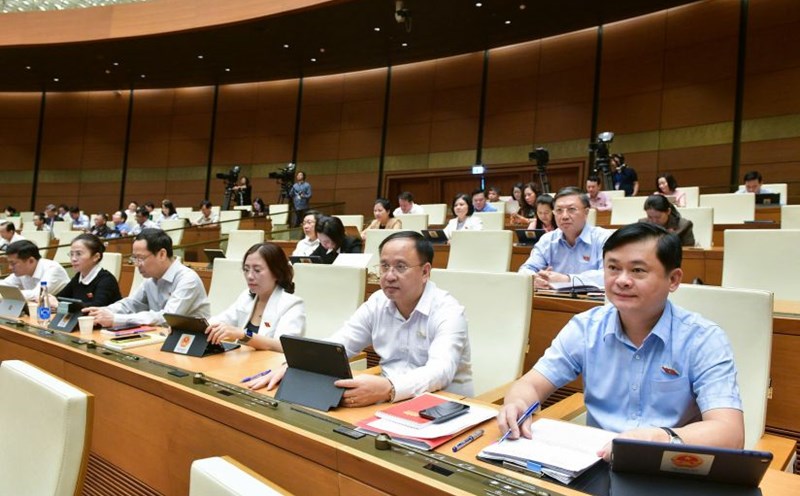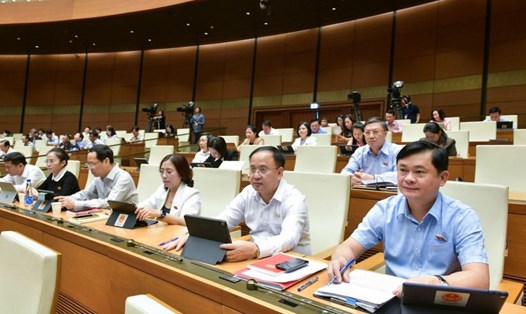Application of technology in tax management
From March 2022, the Ministry of Finance will put into operation the Electronic Information Portal for foreign suppliers, connecting corporations such as Google, Facebook, and TikTok with Vietnamese tax authorities.
In the first 11 months of 2024, the amount of tax paid by organizations and individuals engaged in e-commerce business activities was about 108,000 billion VND, an increase of 22% compared to the average tax amount in the first 11 months of 2023.
In addition, 116 foreign suppliers have registered, declared and paid taxes via the Foreign Suppliers Electronic Information Portal. As of the end of November 2024, the State budget revenue from foreign suppliers was VND 19,774 billion, of which VND 8,687 billion was collected directly via the Portal in 2024, an increase of 26% compared to the same period in 2023.
In addition, the tax sector has promoted the use of technology such as artificial intelligence (AI) and big data analysis to monitor transactions on e-commerce platforms such as Shopee and Lazada. Thanks to that, suspected cases of tax evasion are detected promptly.
At the workshop "Tax compliance management in the digital economy" organized by the General Department of Taxation in May 2024, Mr. Dang Ngoc Minh - Deputy Director General of the General Department of Taxation - commented: Modern technology not only supports more effective tax collection but also creates a transparent and equal business environment between domestic and international enterprises.
Recently, the Ministry of Finance launched an artificial intelligence (AI) tool to support e-commerce tax management. This tool helps monitor millions of transactions on Shopee, Lazada and social networks such as Facebook and TikTok, ensuring transparency, detecting tax evasion and analyzing cash flows. The General Department of Taxation also proposed operating an electronic information portal to support households and individuals in declaring and paying e-commerce taxes. The portal will be deployed in 2 phases: Phase 1 supports tax registration and declaration, phase 2 will be upgraded when the revised Law on Tax Administration officially takes effect, ensuring convenience for taxpayers.
Challenges from retail transactions
Despite many achievements, tax management from small individual businesses is still a difficult problem. Tax evasion tricks in e-commerce are increasingly sophisticated. Many businesses choose to hide their actual locations, use fake identities or cash, e-wallets to make it difficult to trace transactions. Others deliberately declare false revenue to minimize the amount of tax payable. However, with close coordination between tax authorities and functional units, these acts have been and are being strictly handled.
In Hanoi, tax authorities have built a database of more than 220,000 online stores and detected 2,000 cases with signs of violations. Tax evasion such as hiding revenue or using two accounting books has been strictly handled.
Solutions to strengthen e-commerce tax management
The Law amending and supplementing a number of articles of the Law on Tax Administration and the Law on Personal Income Tax, effective from January 1, 2025, is expected to overcome shortcomings in the management of e-commerce and the digital economy.
One of the notable changes is the removal of the “no permanent establishment in Vietnam” provision for foreign suppliers. The new regulation requires all foreign enterprises doing business in Vietnam, regardless of whether they have a permanent establishment or not, to register, declare and pay taxes through the General Department of Taxation’s Electronic Information Portal. This is an important step to help expand the tax base, prevent revenue loss and create equality in the business environment.
In addition, the new Law clarifies the responsibilities of organizations managing e-commerce floors and digital platforms in deducting and paying taxes on behalf of business households and individuals. These organizations must declare the amount of tax deducted and coordinate with tax authorities to ensure proper implementation of their obligations. In cases where business households and individuals are not subject to deduction, they must declare and pay taxes themselves.
To support implementation, the Government will issue detailed guidance documents on deductions, tax payments on behalf of others, and tax declaration procedures. This will both simplify the process for small business individuals and improve the efficiency of tax management by State agencies.
These amendments not only help ensure fairness and prevent budget losses, but also create a transparent legal foundation, creating conditions for businesses and individuals to develop sustainably in the digital economy.
(Posted on the special edition of Lao Dong Xuan At Ty)











